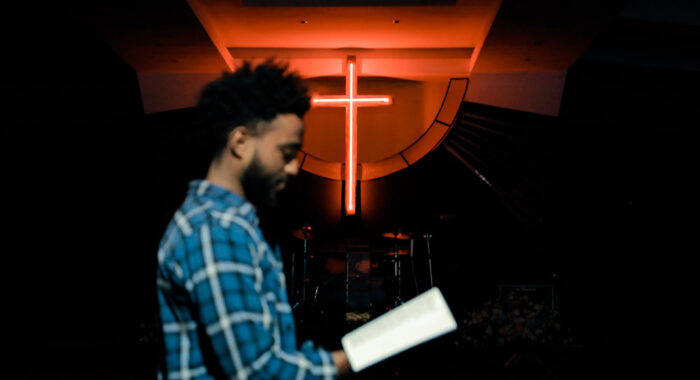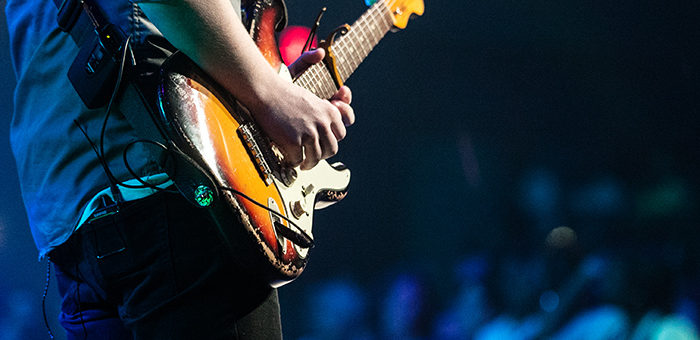Kevin Burgess, now better known by his stage name KB, is a hip-hop artist and head of HGA, a group of young rappers, poets, missionaries and students committed to His Glory Alone. KB spent four years at Trinity College of Florida studying theology and occasionally guest preaches at his home church, Living Faith Bible Fellowship, which is a Converge Worldwide congregation in Tampa, Florida. His latest EP 100 debuted at #1 on Billboard’s Christian Album Chart, #4 on Billboard’s Rap Chart and #22 on Billboard’s coveted Top 200 Album Chart. KB has also won a Dove Award.

Kevin Burgess, now better known by his stage name KB, is a hip-hop artist and head of HGA, a group of young rappers, poets, missionaries and students committed to His Glory Alone. KB spent four years at Trinity College of Florida studying theology and occasionally guest preaches at his home church, Living Faith Bible Fellowship, which is a Converge Worldwide congregation in Tampa, Florida. His latest EP 100 debuted at #1 on Billboard’s Christian Album Chart, #4 on Billboard’s Rap Chart and #22 on Billboard’s coveted Top 200 Album Chart. KB has also won a Dove Award.
How did you come to faith?
I came to faith through music, which is why I’m passionate about the gospel and the arts. As a teenager, I was in a dark situation. I lived in an under-resourced, underprivileged and under-protected neighborhood. I was able to do well in school and got accepted into a program where I could finish half of college before I turned 18. With that kind of setup, I thought, “This is my ticket out. I might be the next Barack Obama. I am secure.” But I found that education and the opportunities that afforded me would not be enough to itch the irritation of a soul that needed God. Then I received a Christian hip-hop CD that was light in the darkness. That CD had a man on the cover who looked like most the people in my neighborhood. I never associated Christian ministry with someone that looks like me. I put the CD in, and loved every song. The last song had a gospel presentation, and I believed the gospel that day. I’ve been walking with Jesus ever since.
What was your path to the Christian music industry?
My path to the Christian music industry was through missions and theology. I never had a vision for being a musician. I wanted to be a missionary and church planter and went to theology school. But there were gifts in me that I hadn’t developed. There was an ability to put words to music, an ear for what was current, and a way to articulate with outsiders what I was about and what I stood for. I began to make music, and this sort of camaraderie of other brothers that were making music and sisters that were doing poetry started. We came together as a group in Tampa, called HGA, which stands for His Glory Alone. We met in my apartment as a Bible study of seven people. Before we knew it, the two-bedroom apartment was packed out. And we would go into the districts of the city that Christians typically didn’t go into, and we would share the gospel and have Bible studies and pray with people. We were also putting into play those gifts of music and artistry through concerts. Some were recorded and put online. It was through that that Lecrae and his record label, Reach Records, became interested in what HGA was doing, and I was invited to join them.
Mainstream hip-hop is often known for music that objectifies women and glorifies gun violence and drugs. How do you operate in this world while maintaining your Christian identity and values?
As a missionary, I try to find ways to penetrate into the worlds of Christ rejection — where Christ is not glorified. I want to be in it, but not of it. But where in mainstream hip-hop darkness is embraced and celebrated, light will not be accepted. We find ourselves swimming in our own ponds when it comes to industry, which turns out to be pretty powerful. Though we aren’t regularly playing in the main market, we are able to empower fans to go into their workplaces, schools and communities, because fans of the main market artists are regular people just like our fans are. The interaction with the mainstream happens in a non-publicized way when our fans are empowered to go into their communities.
Where do you find inspiration for your lyrics?
Life in general. One of the things HGA is very serious about is submitting to a local assembly and to discipleship. Leaders must be led. And having that, you pull from the wisdom of those who have gone before you, and it produces much inspiration and material. In addition when I’m at home, I’m in my community. I’m at the hospital. I’m in the funeral home. I’m in the streets, trying to make sure that I’m a shepherd that smells like the sheep.
What role does Christian hip-hop play in the Church?
The Church, which by and large embraces Christian hip-hop as a legitimate arm of God’s mission in the world, benefits greatly from its ministry because it’s supplemental, encouraging and inspiring. It helps people do the work of the Church.
Who do you think of as your target audience: Christians, non-Christians or both?
Who do we want to buy what we do? Who is supporting this and funding this and being blessed by this the most? It’s going to be our people — those that resonate the most with what we are talking about. However the music has another target that isn’t in the world of marketing but is in the world of ministry, and that’s the nonbeliever. We try to set a table that has room for people from all walks of life to come and be nourished and changed by what we do.
Where is the Christian hip-hop movement headed?
Movements start when something is counter culture, and they are sometimes unmanageable. Soon movements turn into organization, where people bring boundaries into who the movement is and where it’s going. But sometimes the counter culture goes into corporate culture where it turns into a business. And that’s going to happen. But what I hope is that Christian hip-hop, by God’s grace, will always remember where it came from and that counter culture will harmonize with the corporate culture and make something greater together.
This article originally appeared in Evangelicals magazine.



 View All Articles
View All Articles 








